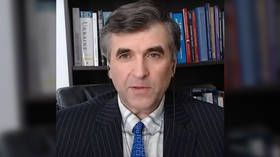Gold bull market upon us & US dollar may be replaced by crypto as reserve currency - Keiser report
With US President Donald Trump escalating his trade war on China, the US dollar has become increasingly unstable, while gold is climbing to all time highs in some 70 currencies – an expert tells RT that is no coincidence.
“2019 is looking a lot like 2010 with the Fed not raising rates but cutting rates as we slip into recession. More negative interest rates [are] driving gold to its best year since 2010 and now silver is starting to pick up too,” Craig Hemke of TFMetalsReport.com told Max Keiser on the latest episode of the Keiser Report. He suggests there is no better time to invest in the precious metal than now.
“If anything, you just simply have to own gold, gold in all its forms. And as the world realizes that and as assets are allocated to gold and precious metals and the mining shares, things are going to look better for everyone,” the expert believes. He noted that gold appears to be entering the blossoming period of its bull market, as investors are trying to secure the future by turning their backs on the increasingly unstable US dollar.
Hemke emphasizes, however, that the tendency the dollar is witnessing should not come as a surprise, as its days as the world’s reserve currency have been numbered from the start.
“The privilege the US had since the end of WW2 is a transitory thing – before the US the British pound was the reserve currency […] The world has switched that mantel every hundred years or so for centuries and soon it is going to be the US’ turn to switch,” Hemke claims.
He notes that speculation as to what will replace the dollar as the global reserve currency has been going on for some time, with many, like the bank of England head Mark Carney, betting on crypto currencies to take the baton. However, Hemke states that crypto coins need to evolve significantly in order to do it, as “in terms of market cap bitcoin is just a fraction of what even gold is [and] its price would have to be considerably higher than what it is now.”
For more stories on economy & finance visit RT's business section














